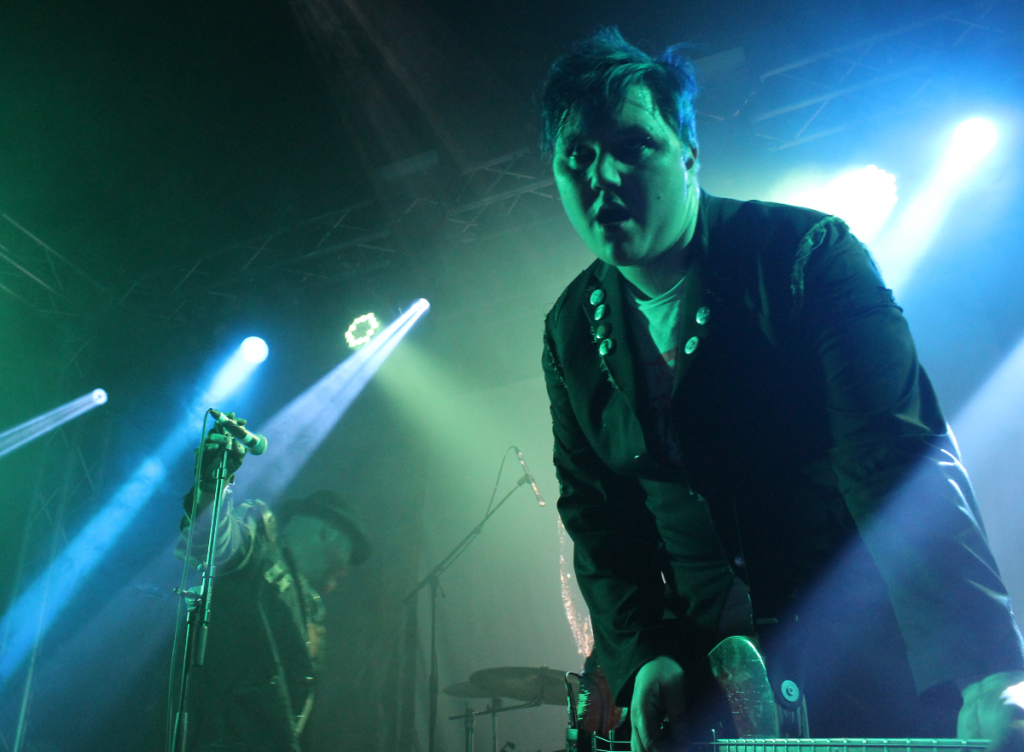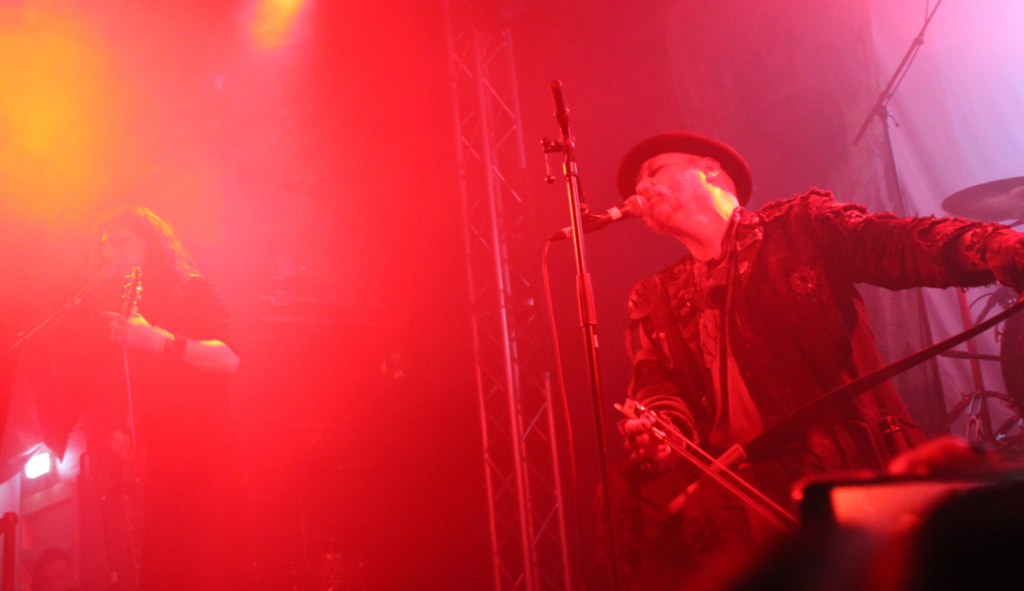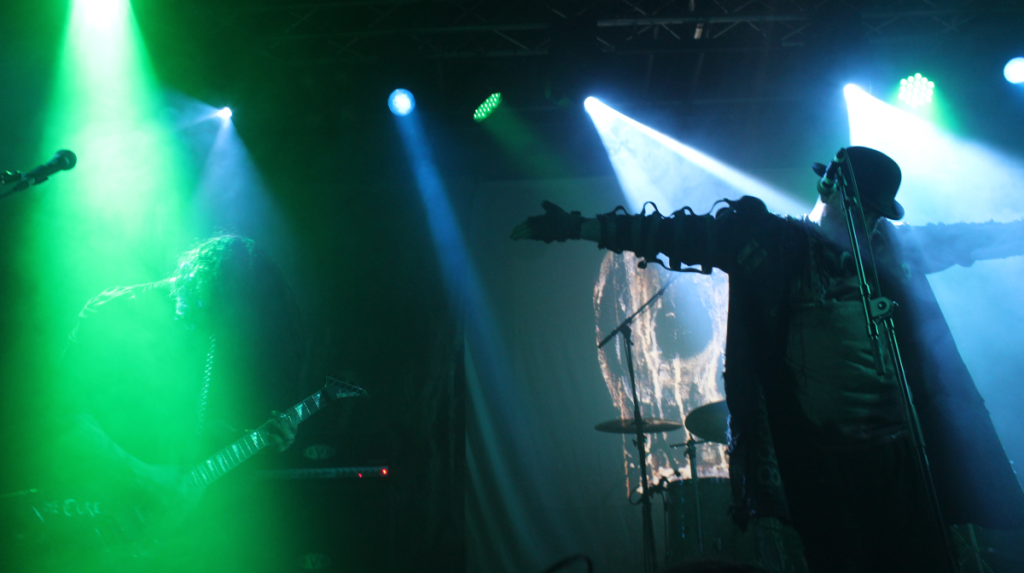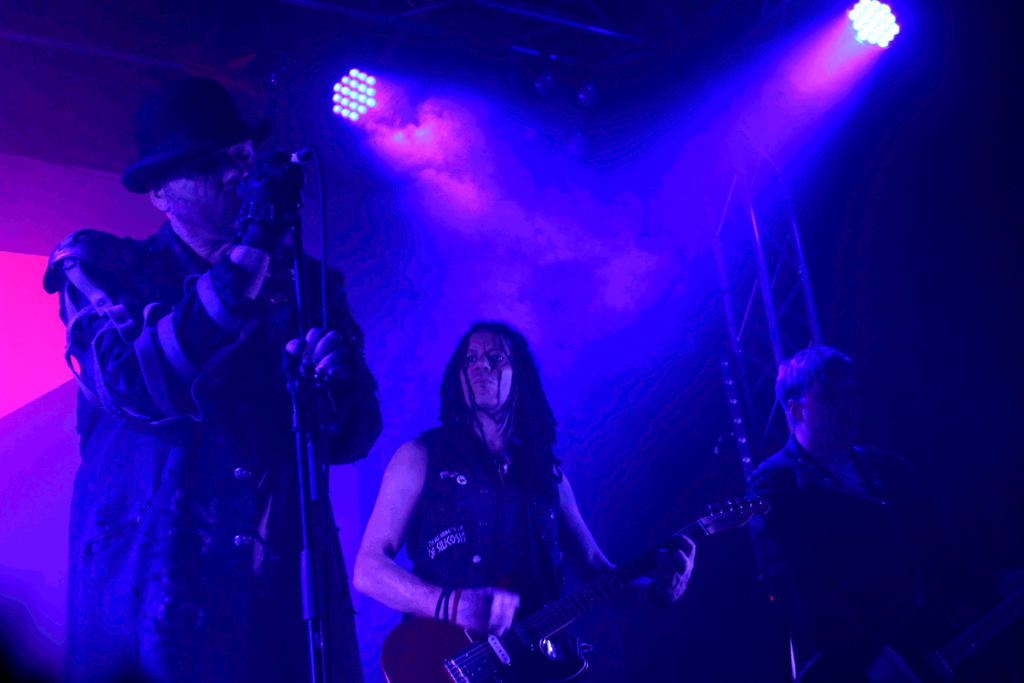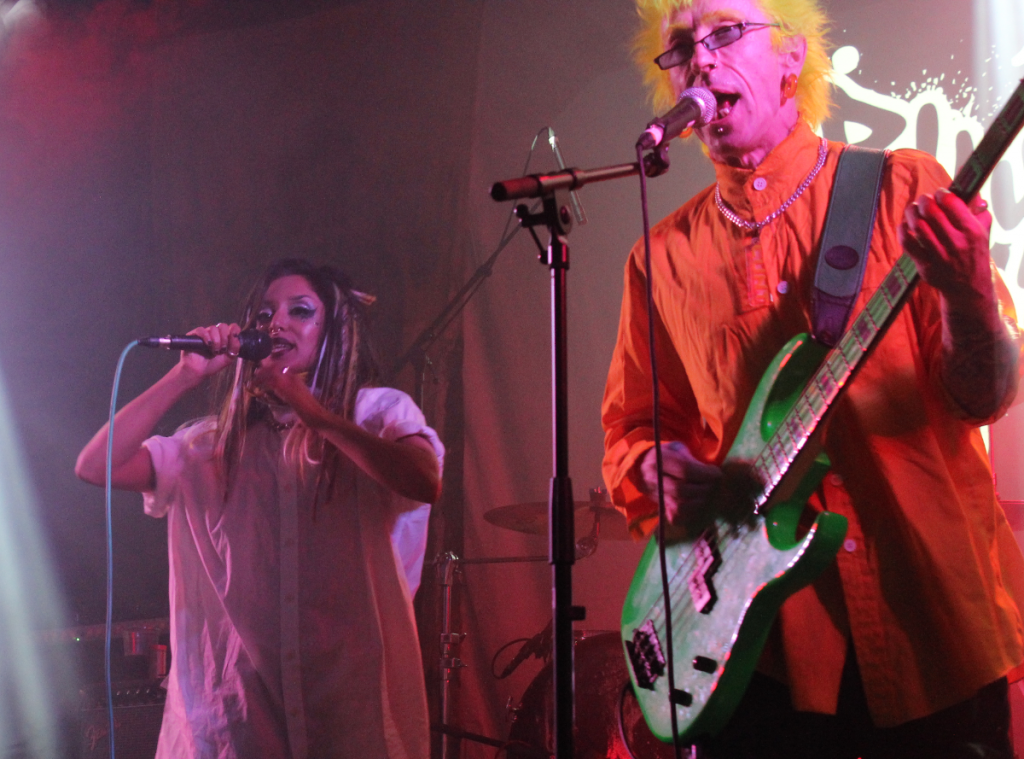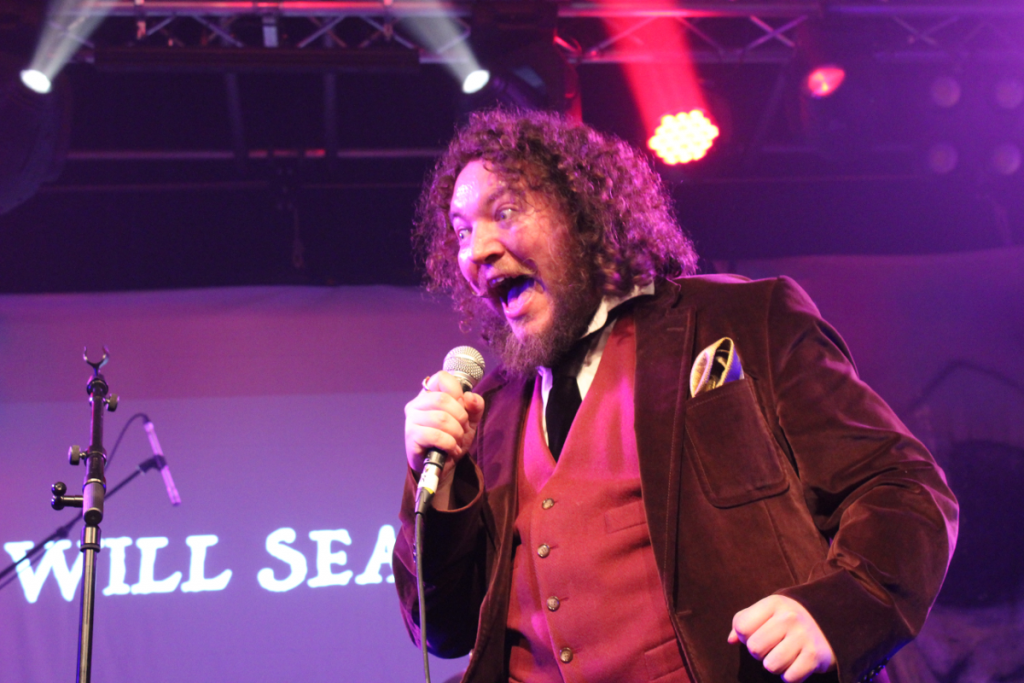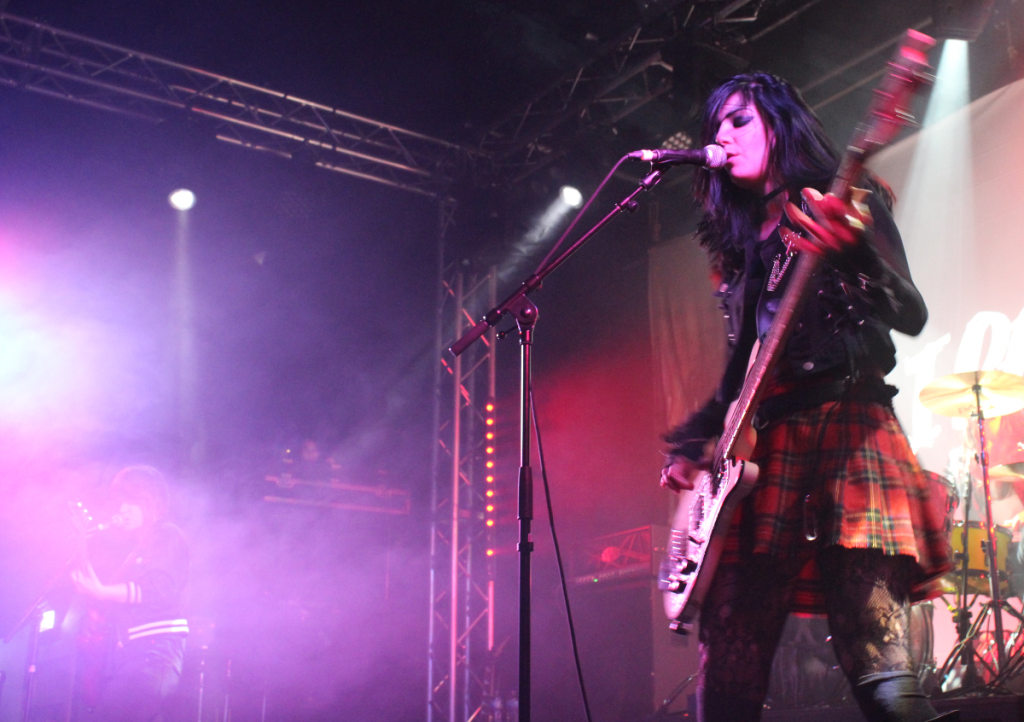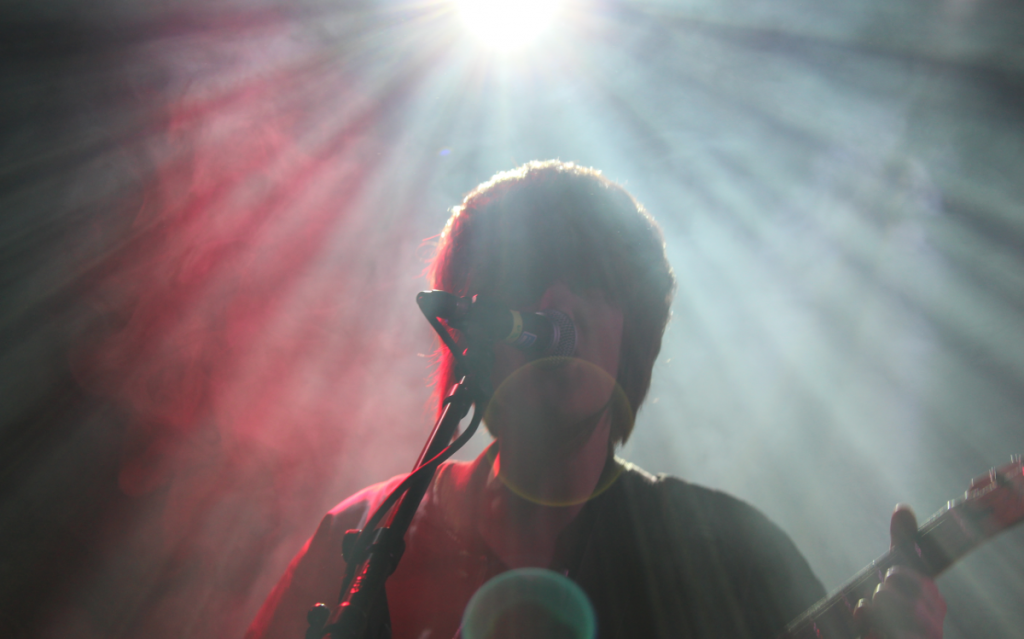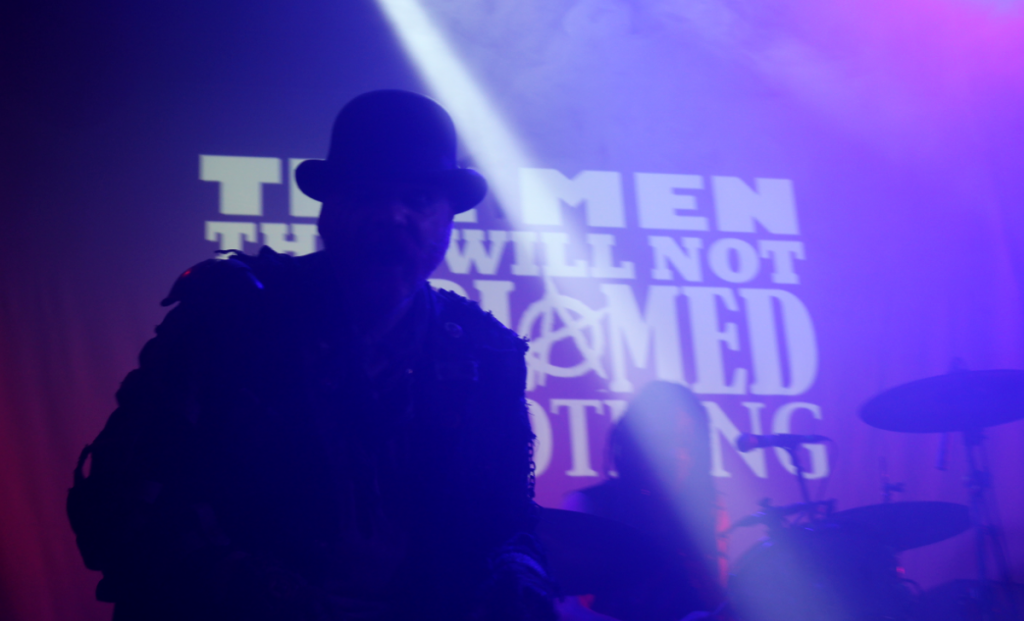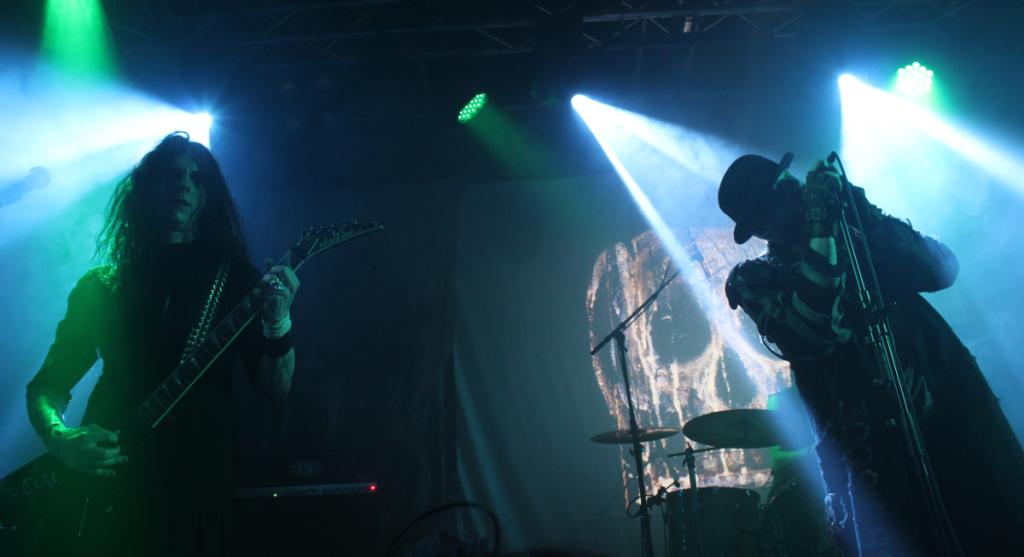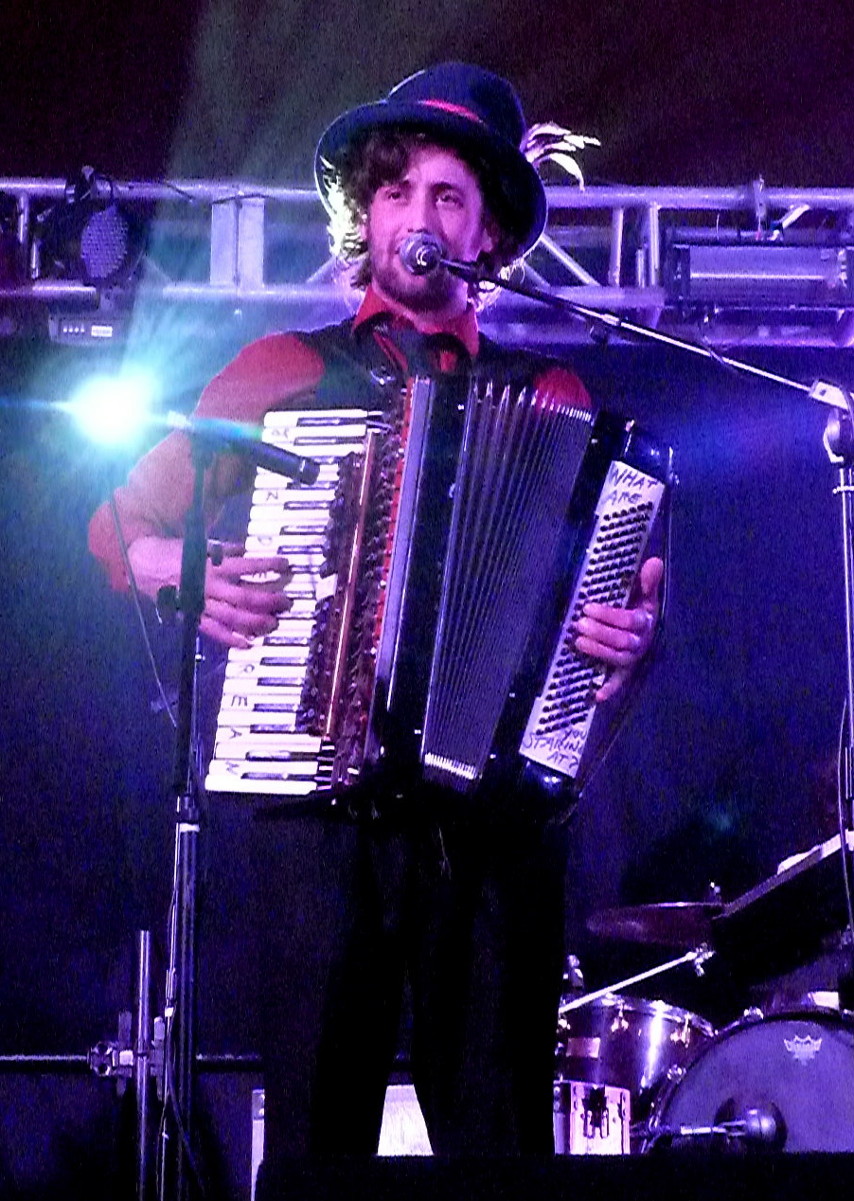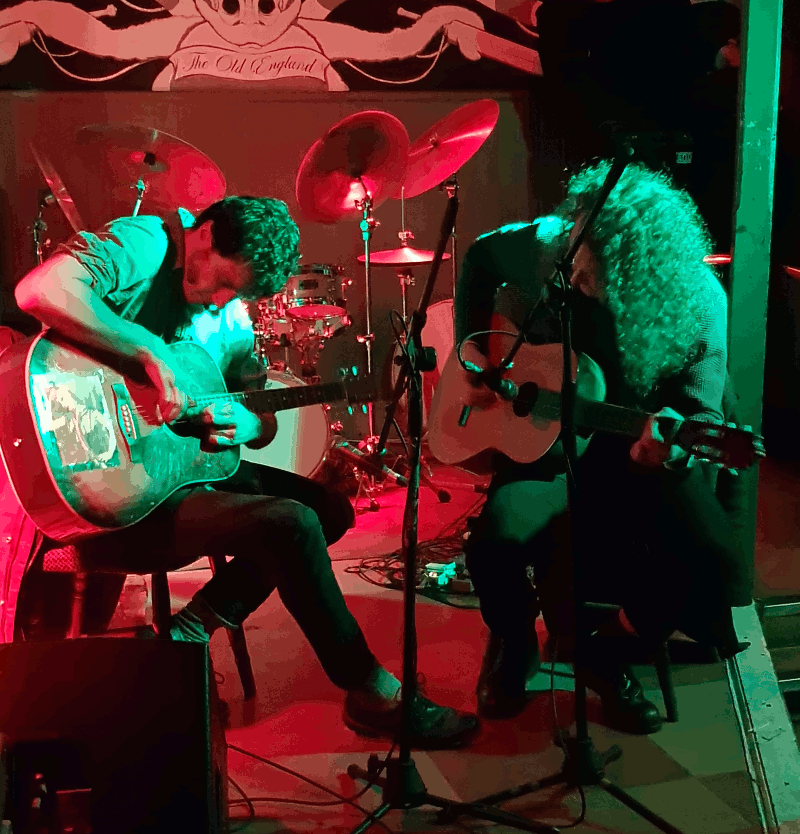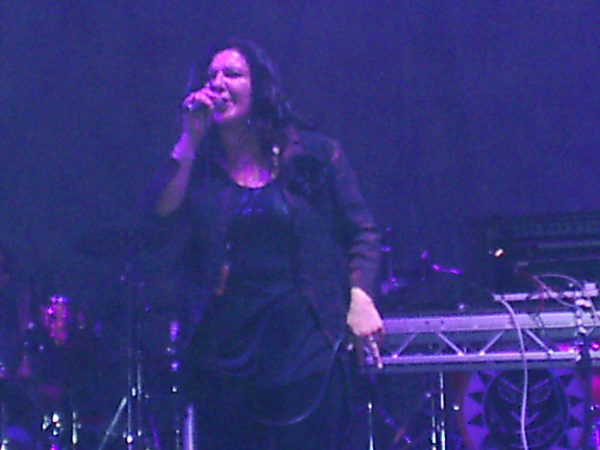London
23 March 2018
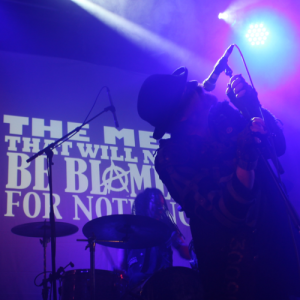 “Andrew O’Neill was living at my house, and he was doing a show about British industry in the nineteenth century and he said ‘why don’t we write some songs and we can do them as a support act for the show?’”
“Andrew O’Neill was living at my house, and he was doing a show about British industry in the nineteenth century and he said ‘why don’t we write some songs and we can do them as a support act for the show?’”
I am sitting in the dressing room at the Tufnell Park Dome, where I used to see Creaming Jesus back in the day. Having failed to find a quiet or empty enough pub, I am interviewing The Men That Will Not Be Blamed For Nothing just before they play the homecoming gig of their UK tour, a gig which sees the band playing in walking distance from most of their houses. Andy Heintz (singing, musical saw, glaring) and Marc Burrows (bass, pogoing, punk-pop enthusiasm, currently ill but not letting it stop him) are telling me how their peculiar vehicle for punk rock Victoriana came to be.
“So we wrote four or five songs off the first album”, continues Andy, “we were going round doing that as the first part of his act, getting booked into different comedy theatres, and we sort of took it from there”. Marc picks up the story. “I know Andrew from standup, and he was talking to me about it one day, and I said ‘oh, do you need a bass player’, and he said ‘well, as a matter of fact we do need a bass player’, and that’s how I joined the band. Coming round Andy’s for an afternoon rehearsal and that was my first exposure. We did three shows for Andrew’s comedy show. Those first gigs we played ‘Bedlam’, ‘Fox’, ‘Charlie’, ‘Stevenson’ and ‘The Boasting Song’. Five-song set”.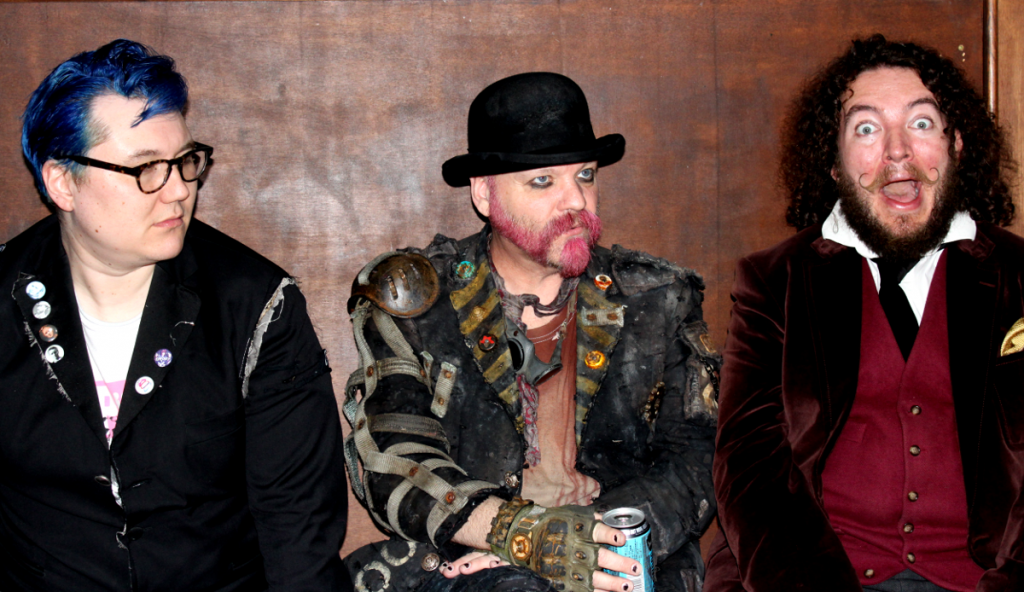
Andy seems as surprised by this as anyone. “I didn’t expect it to last longer than that comedy tour and then we were kind of adopted by the steampunk scene which was just starting to take off”, he recalls. “We played the first Lincoln steampunk fair. And this guy was there who organised the biggest steampunk convention in America”, says Marc. Andy adds, “We thought he was a fantasist”. Marc laughs. “Oh, he is, he absolutely is. He’s just a fantasist who runs a successful Comicon thing and had the money to take us to America”.
“Basically we recorded a really shitty demo and we hadn’t recorded anything properly”, says Andy, still seming like he doesn’t quite believe it. “He heard them and on the strength of these really rubbish demos he said ‘I’m going to take you to the States’. And he turned up, and we still thought he was mad, and then he bought us flights and booked us hotels”.
Marc contextualises. “The steampunk scene existed as a thing, and all the music in it wasn’t particularly…” (“Good” says Andy with a smirk) “…exciting or good, and there were only a handful of bands. And a lot of people in the scene were into music, but they were into the kind of music that wasn’t being serviced in that scene. Some we come along doing steampunky Victorian stuff who were also a punk band, and they were like ‘Ooh!’ So we had this instant fanbase. So yeah, this whole thing of putting the punk in steampunk,. That was sort of the motto for the band to begin with, and as it rolled forward we kind of left the specific subculture of steampunk behind and took our own little twisted Victorian route.“It started to snowball, because from one end you’ve got the people who come along for the Victoriana and get a kickass rock band, and then from the other you’ve got people who come to see a rock band and get this unique different image and Cockney knees-up stuff and an entertaining show as well as a really good band, so on both ends it started to snowball, and I think that’s the secret to it, that’s how it’s become this kind of cult thing, because we overlap in so many different areas, and in each of those areas we bring something that the other bands in that area don’t have. I mean, you can go and see any number of punk bands, but you don’t get them singing about cholera. And if you go to a steampunk convention you won’t find that many really good punk bands.
“So yeah, as it’s gone along and we’ve kind of ploughed our own furrow that was totally different to pretty much anything anyone else is doing, and as it’s gone on, it’s gathered people from here and here and here, and if you go to our gigs… some people heart the word steampunk and it’s not a word we really use in our own material anymore, and they come expecting to see that, and you don’t really get that — you do get a couple of people in the top hats and things, but it’s a much more broad church, you get punks and goths, and people who are Creaming Jesus fans, and people who followed Andrew’s comedy and have come from that, or my comedy to a lesser extent. And it’s created this weird little cult fanbase that we’re extremely proud of. And it’s completely unique, and to get back to your original question that I’ve rabbited off of, it’s not something that any of us expected. I think we always wanted to do something with it; I remember Andrew saying to me early on ‘I think Andy’s starting to take this seriously now, I think he’s taking it as seriously as his other band’”.What Marc doesn’t realise is that he’s just made my job a hell of a lot easier, because later, as the crowd begin to arrive, they are exactly how he has described them. A few years ago you couldn’t move for hats and bits of clock, but these days you could get literally anyone moshing to The Men, from science fiction nerds to anarcho-punks.
“I think it was always in Andrew’s head that we could make it into a real thing. The thing that’s made it work is that we’ve made satisfying music, and if it had just stayed how it was when we made that first album it wouldn’t have grown. But musically it’s continued to evolve as it’s gone on, we’ve continued to push it, and it’s always moved on and become a different thing. And every album’s built on the last one and we’ve been able to take it in a lot of different ways”.And their current direction is a dark one indeed. The latest album, Double Negative, is a spiky ball of aggressive thrash taking some of the most sordid aspects of Victorian life as its backdrop.
“Tonally, Andy’s lyrics have always been dark, and it’s just a case of using the lyrics that Andy’s written. Did you make a decision to write darker words?” asks Marc. (Yes, now they are interviewing each other. What helpful chaps! This is a piece of piss!) “I don’t think they are particularly darker” replies Andy. “Each of the previous albums had a certain amount of throwaway knockabout songs which were whimsical and silly, and this album we’ve turned our back on that”. Though he’s quick to reassure “There’s humour there, there’s lots of humour there”.
Marc again: “There are a few reasons for that. One of them was just to go ‘we’re a real band, this is what we do, honestly we’re not pissing about here, we can do this’, but also I think we wanted to do quite a streamlined record, because over the last few years we’ve had all these bits and pieces lying around, riffs from rehearsals and soundchecks, and Andy had loads of lyrics, and we didn’t have very many whole songs.
“‘Supply And Demand’ was the only new song we had for about a year, and then we went ‘OK, the best thing to do to record an album quickly is we’ll take all the bits that sound like they’re gonna be short heavy punk songs and make an album of that, and all the other stuff, which sounds a lot weirder — we’ve got one song we were jamming for ages which came out at eleven minutes — we’ll take all those and we’ll work on those later, and that’ll be the next album. So for this album we’ll work on this side of the band’. I don’t think we decided for it to be darker, although it is darker anyway, I think it’s more that we decided not to do the knockabout stuff, and what you get left with is the the dark heart at the centre of the aniseed ball”.
“It’s interesting reading reviews because there are some parallels that were pretty obvious…” (“Sweatshop labour, etc” adds Andy) “…and some that were a complete surprise to us. The way I always think about it is that the world we live in now was built by the Victorians. The society that we inhabit now is fundamentally not that different from the one we inhabited 150 years ago. The class system still exists, the system of government — a two-party system, a parliament, a monarch — industry, capitalism, a rail network… all of those things were kind of [there]; we don’t live in a world that is very different from 150 years ago.
“On the surface it seems it is, but there was a different way of doing everything — international transport, mass communication, telegrams — all of those things we take for granted were there. The reason you see parallels is because it’s the same society. Things have just evolved and moved, but the heart of it is that things haven’t really changed that much, so when you write a song about something that happened 150 years ago, a lot of it could still happen today. There is still factory labour, there are still bungled police operations”.
Andy picks up the thread. “I went back and listened to the lyrics I’d done and suddenly it occurred to me that everything seems to be anti-capitalism, all of it is totally anti-capitalist and left wing, which is where I come from anyway, but I hadn’t realised how much of it was coming out. It’s the backwards steps things have taken in the last five years. Somebody’s got to kick back against that, because I’ve been living in a bubble thinking everything was fine, but the last five years have really upset that”.“I do remember around the time of the refugee crisis we were all genuinely angry and we wrote a really angry song about it”, says Marc. “It was one of the only times we said ‘let’s write a song about this’, but in the end the song wasn’t good enough to make the cut. So there was a lot of that feeling floating around, because we were and are angry. And if you watch the show tonight, when it gets to “There’s Going To Be A Revolution”, and even going back to “Doing It For The Whigs”, then it all kind of fits together. “Doing It For The Whigs” is a good example of us living in the same society — I mean that song is written from the perspective of then, but it’s the same problems, the same class system, the same two-party system, it’s literally railing against the Tories”.
But it’s not all Victorian. The death of Marie Curie, for example, surely that has to fall outside their remit? “It’s only a few years out!” laughs Andy. “The Curie one came about when I was in chemotherapy and radiotherapy, and I was beating cancer, and I started researching into the people who did the research. And also, ‘Can you cure yourself, Curie?’ was funny enough! The song was originally called ‘What’s The Story, Madame Curie?’ Now it’s called ‘There She Glows’”. Some puns are indeed too hard to resist, even for The Men That Will Not Be Blamed For Nothing at their darkest.“There’s never been a set of rules for the historical context of the band”, says Marc, “there’s never been a thing where we write songs that go from this period to this period, it’s always just been songs that fit into our kind of worldview. ‘Steph(v)enson’ covers the early nineteenth century to the late nineteenth century, ‘Doing It For The Whigs’ is 1832…” (“basically, we like Dr Who”, interrupts Andy) “…The Great Stink’ is 1858, ‘Occam’s Razor’ is 1888…”
“Which is extremely insensitive”, adds Andy. “It’s the kind of thing the kind of people who would write a song about a noted scientist dying of radiation poisoning and then create a glow-in-the-dark T-shirt would do. That’s the kind of darkness people like that would exploit”. We all laugh like it’s the end of a heartwarming sitcom from the 1950s.
*
Out in the venue the crowd is starting to fill out, and everyone is waiting to see the first act, Polly Pik Pocketz. Andy’s been busy on social media telling everyone to make sure they turn up early enough to see the supports, because The Men’s philosophy has always been one of having a full evening of fun. (As he puts it, “I think, if you’re gonna put on a night, don’t put on shit because that just brings everyone down. Put on the best entertainment for the whole evening”. Marc’s take is, “We’ve always prided ourselves on bills that bring out different elements of the band, so we’ll put on a really fucking heavy band, and a really weird band… we’ll put on a comic, and we’ll put on a local band, and we’ll put on some mates, and just make a nice thing that doesn’t contextualise in any way, it actually does the opposite, like the prism on Dark Side Of The Moon”.) Even before they start playing, I’ve decided it’s a crying shame that Polly Pik Pocketz (who Marc describes as “Mates of ours, we share a rehearsal space with them and just knock about with them. They opened for us a couple of months ago and we were like ‘oh, fuck!’) don’t have their own Adult Swim cartoon. A punk dude, a guy who looks like Metalocalypse‘s William Murderface, a rock’n’roll drummer who mimes wafting away a fart during the dropout and a tiny woman with an enormous voice, they’re definitely fun. Think a more punk Skunk Anansie with jokes, a dual-vocalled, double-barrelled Stooges, switching from jittery Talking Heads pop to Judas Priest and touching all points in between… they’re utterly demented, and utterly delightful. The next act is Will Seaward, who Andrew O’Neill told me was “the funniest comedian I’ve ever seen. The only comedian to actually make me be in danger of falling off my seat. I was laughing so hard I felt sick. So I went back the next night”. And he’s fucking hilarious.Looking like a cross between Charles Dickens and Charles II, Seaward has the voice of Brian Blessed and an amazing absurdist pirate story to tell, frequently interrupted by his own laugh, as booming as it is infectious. Putting spoken word stuff in front of crowd here for loud music is always a gamble, but I think with this guy The Men have hit the jackpot. I could have watched him all night, but no, there’s still more music to come before The Men kick in. It’s a real variety show, a not-shit inland Seaside Special.
In the exact opposite of the true spirit of journalism, I have deliberately not done any research and have studiously avoided hearing I Destroy. Having read reviews and heard Andy’s enthusiastic praise for them (“an absolute delight. We’ve had them on every date of the tour, and it would be an absolute shame if anyone were to turn up late and miss them”, says Andy, while Marc elaborates “Destroy are in that nice little middle of the Venn diagram between alternative rock and punk, and there’s a bit of Sleater-Kinney in there, and a bit of the rock and roll of The Hives in there and a bit of grunge, and it all kind of folds together. And their musicianship is irritatingly good”.) I made a conscious decision that this was something I would probably want to experience live first. They themselves told me that their music had been called “party punk” which, setting aside the truism that all punk is essentially party music, doesn’t really tell me much. “You’ll understand when you’ve seen us”.Sadly, we live in quite an unpleasant world, and as Andy says, I Destroy have “also taught us what creepy men fans are… There’s people just going right down the front trying to get shots up skirts, and if you go onto their Facebook pages, every single picture is them with a new girl band. It’s almost like their whole house is covered in pictures of these bands with them in the middle. Like Top Trumps”. You’d have thought this kind of creepiness belonged in the past, really, but in the #metoo era, us men are learning exactly what it is women have to put up with on a daily basis. Urgh, really. Everything is awful — well, not everything. I Destroy, for example, are fucking ace.
If we absolutely must gender our comparisons, there’s a lot of The Runaways in there, a bunch of L7 and even a wee smidgeon of Toni Basil. But setting that aside, there’s also bass soloing on a New Model Army level and even bits where they don’t sound entirely dissimilar to Motörhead. I think Lemmy would have approved. They’re fun, and angry, and angry, and fun, and loud and raucous, and I think back to what Marc said earlier, that “they take being the support band very seriously. They don’t just come on and do their set, they think ‘it’s our role to get the audience warmed up for the main act’, so they incorporate and unfold that into their performance” and realise just how right he was. By the time they leave, even the sleepiest audience members are riled up and ready to rock, or at least to continue rocking.“Supply And Demand” brings The Men on in style, kicking straight in with its stompy Oi goodness. “Who wants to hear a song about dead babies?” asks Marc, and the crowd go wild for “Baby Farming”.
Over the course of the rest of the evening, The Men prove without a doubt that, as Marc said earlier, “we’re not pissing about here”. They’ve built up an impressive back catalogue of Victorian bangers, from the atheist goth-rock of “This House Is Not Haunted” to the Killing Joke grind of “There’s Going To Be A Revolution”, harsher and grindier than the album version and twinned with “Doing It For The Whigs”, during which Andrew delivers a righteously impassioned rant about women’s reproductive rights. But even the angry, dark 2018 Men like a laugh. The Lovecraft-By-The-Sea death metal of “Margate Fhtagn” and the whimsical “Moon” still have a place here, and everything fits together seamlessly into one big (steam) engine of RAWK. Andy brings up the creepy male fans thing again with “I’m In Love With Marie Lloyd”, played in front of a Scooby-Doo backdrop with Andrew exhorting the crowd to “dance like it’s 1967, it’s Top Of The Pops, and this isn’t the band you came to see”. Except, of course, this IS the band we came to see, and they’re playing to a hometown crowd. What could possibly go wrong?Nothing, it would appear. Absolutely nothing.
This, as GlaDOS would say, was a triumph.
-Words: Justin Farrington-
-Pictures: Samantha Penny-
